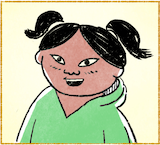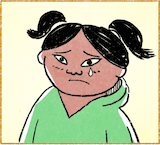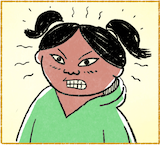


เขากำลังเฮ็ดหญัง มีพุหญิงคนหนึ่ง เป็นเด็กน้อยดอก เขากำลังยิ้มอยู่ เขากำลังยิ้ม เขาคือสิดีใจ
เป็นหญังเขาคือยิ้ม บ่ลู้คือกันจักว่าเขายิ้มเฮ็ดหญัง เขาคือสิมีความสุข คือสิมีความสุข เขากะเลยยิ้ม
คือฮู้ว่าเขายิ้ม กะฮู้ว่าเขายิ้ม เพาะว่าเขากำลังดีใจ เบิ่งสีหน้าของเขาแล้ว เขากะดีใจอยู่ เขาอ้าปาก แล้วกะมีฮอยยิ้มอยู่ในหน้าของเขา กะฮู้ว่าเขากำลังดีใจอยู่ หลือว่ามีความสุขอยู่
7
พุหญิงคนนี้เป็นอี่หยัง เขากำลังฮ้องไห้ เสียใจอยู่ กะบ่ฮู้คือกันว่าเขาเป็นหญัง เขากำลังเสียใจ
เบิ่งสีหน้าของเขาแล้ว มีแต่ความเส้า มีแต่ความหมอง บ่มีความสุขอี่หยังเลย
ปากของเขากะฮอยลง บ่เป็นตามีความสุขหลาย เทิงมีน้ำตาแล้ว มาจากตาของเขาพ้อม คิ้วของเขากะตก คือสิบ่มีความสุขคัก คือสิเส้าสิหมองคัก
8
พุหญิงคนนี้เขาเป็นอี่หยัง เขากำลังใจฮ้ายอยู่ เขากำลังโมโห คือสิสูนคัก
คือฮู้ว่าเขาสูน คือฮู้ว่าเขาโมโห กะฮู้เพาะว่าเบิ่งจากสีหน้าของเขาแล้ว
แล้วเขาเฮ็ดหน้าจั่งใด เขากะเฮ็ดหน้าโมโห เป็นตาสูนคัก มีลมออกจากหัวเขาพ้อม ตาเขากะขึงๆ ขึงขังคัก
แล้วแข้วของเขากะกัดแข้วอยู่ คือสิสูนคัก คือสิโมโหคัก คือสิใจฮ้ายคักกะด้อกะเดี้ย
เบิ่งแล้วใจฮ้ายคักอี่หลี จักสิใจฮ้ายใผกะบ่ฮู้คือกัน คือสิโมโหคัก โมโหแน่ ใจฮ้ายคัก ใจฮ้ายแน่
Link to overview page
Link to dictionary
| Isaan | Pronunciation | Tones | Thai | English/Notes |
|---|---|---|---|---|
| เขา | khao | M | เขา | personal pronoun: he, she |
| กำลัง | gam-laŋ | M-HR | กำลัง | auxiliary indicating continuous or progressive action |
| เฮ็ด | het | H | ทำ | to do, to make |
| หญัง | ɲaŋ | M | อะไร, เป็นหญัง = ทำไม | 1. what {เขากำลังเฮ็ดหญัง = What is he doing?} {ธูปเอาไว้เฮ็ดหญัง = What are incense sticks for?} 2. something, anything, (nothing) 3. เป็นหญัง[...]คือ in initial position: why {เป็นหญังเขาคือใส่บักพิกลงไปในกวยเตียว = Why is he putting chili in [his] noodle soup?} {เป็นหญังหน้าต่างมันคือเปิด = Why is the window open?} {เป็นหญังมันคือมีควนไฟ = Why is there smoke?} |
| มี | mi: | HR | มี | 1. to have 2. there is |
| พุหญิง | phu-ɲiŋ | H-M | ผู้หญิง | woman, female |
| คน | khon | HR | คน | person, people |
| หนึ่ง | nʉŋ | H | หนึ่ง | 1. one 2. after adjective: intensifier {บักคักหนึ่ง = very much} {อันบักใหญ่หนึ่ง = very large}, or attenuates the meaning {กะดาดมันแผ่นน้อยๆ หนึ่ง = the piece of paper is [relatively] small} |
| เป็น | pen | M | เป็น | 1. to be, to exist 2. to be able to 3. to suffer, sth. happens to 4. เป็นหญัง[...]คือ in initial position: why? {เป็นหญังเขากะคือแปงฟัน = Why is he brushing his teeth?} {เป็นหญังเคี่ยงบินมันคือสิตก = Why is the airplane falling down?} |
| เด็กน้อย | dek-nɔ:i | M-HF | เด็ก, เด็กน้อย | child |
| ดอก | dɔ:k | LF | หรอก, ดอก | 1. particle used after a negative, relativizing or explanatory statement to make the sense milder {กินเข้าบ่ บ่กินดอก = Are you going to eat [with us]? No.} {เป็นก้อนสี่เหลี่ยม ก้อนน้อยๆ ดอก = These are cubes, small cubes.} {แล้วกะมีลดคันหนึ่งขี่ผ่านมา เป็นลดเก็งดอก = And there's a car passing, a sedan.} 2. particle used to emphasize (not necessarily a negative) contrast 3. particle used for emphasis {ดอกไม้นี้งามบ่ กะงามอยู่ เบิ่งงามๆ ดอก = Is this flower beautiful? Yes, it's beautiful, it looks beautiful} |
| ยิ้ม | yim | HF | ยิ้ม | to smile |
| อยู่ | yu: | H | อยู่ | 1. to be (located) at 2. yet, still 3. auxiliary indicating continuous or progressive action {ทอดปาอยู่ในกะทะ = (in the process of) frying a fish in the pan} {แม่กำลังเมี้ยนเฮียนอยู่ = mother is cleaning/tidying up the house} |
| คือ | khʉ: | HR | คือ | 1. to be, to resemble, like, as 2. why {บักหล้าคือบ่เก็บโต่ะแน่ = [addressing a young boy] Why haven't you cleared the table?} |
| สิ | si | M | จะ | future tense auxiliary {เขากำลังสิตื่น = he's about to wake up} {สิไปตะหลาด = [I'm] going to the market} |
| ดีใจ | di:-jai | M-M | ดีใจ | happy, glad |
| บ่ | bɔ: | H | ไม่ | 1. no, not 2. question particle, transforming a statement into a question Notes: spelling exception in line with common usage on social media |
| ลู้ | lu: | HF | รู้ | 1. to know 2. to understand Notes: equivalent to ฮู้ |
| คือกัน | khʉ:-gan | HR-M | เหมือนกัน | 1. also, likewise, similarly {ยินดีที่ได้ฮู้จักคือกันคับ = Nice to meet you too!} 2. in negative sentences: either {บ่ลู้คือกัน = I don't know either} {จักคือกัน = I don't know (either)} |
| จัก | jak | M | จัก | 1. answer to a question: [I] don't know, don't know exactly, [I'm] not sure {พุซายคนนี้เขาเถ้าไป่ จัก จักเถ้าหลือบ่เถ้า เบิ่งบ่ค่อยออก = Is this man here already old? I don't know. I can't see clearly whether he's old or not.} {เขาเว้ากันอยู่ใส จักคือกัน = Where are they talking? I don't know either.} 2. exact(ly), what exactly {จักต้มอี่หยังกะบ่ฮู้ = I don't know what (exactly) he is cooking} {บ่ลู้คือกันจักปาอี่หยัง = I don't know either what kind of fish this is} 3. how much/many? {ต้นไม้มีจักต้น = How many trees are there?} {ตอนนี้จักโมงแล้ว = What time is it now?} {มือของเฮานี้สิมีจักนิ้ว = How many fingers do our hands have?} 4. a bit, a little bit {จักหน่อย/จักหน่อยหนึ่ง = a bit, a little bit} |
| ว่า | wa: | H | ว่า | 1. that, as {คำว่า X = the word X} 2. to say |
| ความสุข | khwa:m-suk | HR-M | ความสุข | happiness |
| กะ | ga | M | ก็ | 1. then, consequently 2. also |
| เลย | lə:i | HR | เลย | 1. futher on, beyond, past {เข็มน้อยเลยเลขสิบสองไป = the minute hand has passed number twelve} 2. too much 3. at all 4. definitively 5. completely, utterly |
| ฮู้ | hu: | HF | รู้ | 1. to know 2. to understand Notes: equivalent to ลู้ |
| เพาะว่า | phɔ-wa: | H-H | เพราะว่า | because |
| เบิ่ง | bəŋ | H | ดู | 1. to look at, to see, to watch {เบิ่งโทละทัด = to watch TV} {เบิ่งหนัง = to watch a movie} 2. to guess {เบิ่งซงแล้ว ... = [I] guess / from what it looks like ...} |
| สีหน้า | si:-na: | M-LF | สีหน้า | face, facial expression |
| ของ | khɔ:ŋ | M | ของ | of, belonging to |
| แล้ว | lɛ:o | HF | แล้ว | 1. finished 2. already 3. and then, and next (especially แล้วกะ) 4. auxiliary for past tense |
| อ้า | a: | HF | อ้า | mouth, door, window: to open, to stand open {อ้าปาก = to open the mouth, to have the mouth open} |
| ปาก | pa:k | LF | ปาก | mouth |
| ฮอย | hɔ:i | HR | รอย | mark, trace |
| ใน | nai | HR | ใน | in, within |
| หน้า | na: | LF | หน้า | 1. front {ปะตูหน้า = front door} 2. face {เขากำลังล้างหน้า = he's washing his face} 3. auxiliary: conditional tense {เขาหน้าสิเป็นพุบ่าวพุสาวกัน = they are probably groom and bride} {กะหน้าสิส้มอยู่ = it's likely to be sour} 4. season {หน้าฮ้อน = hot season} 5. page 6. clf. for pages {เฮาอ่านฮอดหน้านั้นแล้ว = we've read until this page} |
| หลือ | lʉ: | M | หรือ | or |
| นี้ | ni: | HF | นี้ | 1. this 2. here |
| อี่หยัง | i:-yaŋ | H-M | อะไร | 1. what {นี้คืออี่หยัง = What is this?} {มื้อนี้เจ้าเฮ็ดอี่หยัง = What are you doing today?} {กินเข้างายกับอี่หยัง = What did you have for breakfast?} 2. something, anything, (in negations) nothing {บ่ต้องเฮ็ดอี่หยังอีกเลยนอกจากใส่ปุย = [we] don't need to do anything besides adding fertilizer} |
| ฮ้องไห้ | hɔ:ŋ-hai | HF-LF | ร้องไห้ | to cry, to weep |
| เสียใจ | si:a-jai | M-M | เสียใจ | sad |
| แต่ | tɛ: | H | แต่ | 1. but {แต่บ่ต่างกันหลาย = but not very different} {แต่บ่ลู้ว่าเขาญ่างมาแต่ใส = but [I] don't know where he's coming from, see also: แต่ว่า} 2. only {ตอนนี้มีแต่ขี้ฝ้า = now there are only clouds} |
| ความ | khwa:m | HR | ความ | 1. prefix: state, condition, quality 2. content, subject, matter, affair |
| เส้า | sao | LF | เศร้า | sad, sorrowful |
| หมอง | mɔ:ŋ | M | หมอง | sad, gloomy |
| ลง | loŋ | HR | ลง | 1. to descend, to lower, to go down 2. down 3. bus/train etc.: to get off, to disembark {คนกำลังลงลดบั่ด = people are getting off the bus} 4. boat/ship etc.: to get on, to board {เขากำลังญ่างลงเลีย = he's boarding/getting on the boat} |
| ตามีความสุข | ta:-mi:-khwa:m-suk | M-HR-HR-M | happy, to look happy | |
| หลาย | la:i | M | เยอะ, มาก | many, much, very |
| เทิง | thə:ŋ | HR | ทั้ง | 1. up to, all, all of, the whole of, altogether {เขาใส่กางเกงขาสั้นเทิงสองคน = both are wearing short trousers} {เขาเป็นพ่อของลูกเทิงสามคนนี้ = he's the father of these three [children] here} 2. เทิง ... เทิง ...: both ... and ..., ... as well as ... {เทิงมีใบพ้อม เทิงมีเหลียนพ้อม = there are notes as well as coins} Notes: pronunciation: also realized as ทัง |
| น้ำตา | na:m-ta: | HF-M | น้ำตา | tear, teardrop |
| มา | ma: | HR | มา | 1. to come 2. auxiliary expressing action towards the present or focal time {กะคุเฮ็ดมาจากอี่หยัง = What is the bucket made of?} {แล้วเขากะเก็บเงินจากพุนั้นมา = and then she takes the money of that person} |
| จาก | ja:k | LF | จาก | 1. from {... เฮ็ดมาจากอี่หยัง = ... is made from what?} 2. to depart |
| ตา | ta: | M | ตา | eye {เขามีตาสองข้าง = he's got two eyes} {หลับตา = to close one's eyes} |
| พ้อม | phɔ:m | HF | พร้อม | at the same time, also, too {มีตะเว็นพ้อม = the sun's out, too} {กะทะมีด้ามพ้อม = the pan has also a handle} |
| คิ้ว | khiu | HF | คิ้ว | eyebrow |
| ตก | tok | M | ตก | 1. to fall, to drop 2. sun: to set {ตะเว็นตกดิน = the sun is setting} |
| คัก | khak | H | intensifier: very, very much | |
| ใจฮ้าย | jai-ha:i | M-HF | โกรธ, อารมย์เสีย | irritated, annoyed |
| โมโห | mo:-ho: | M-M | โมโห | angry, annoyed, furious |
| สูน | su:n | M | โกรธ | angry |
| จั่งใด | jaŋ-dai | H-M | ยังไง, แบบไหน | how, in what manner {บักนาวมันมีลดซาดจั่งใด = Lime fruits have what kind of taste?} {เขาปิดแอจั่งใด = How is he switching off the A/C?} {เทียนใซ้จั่งใด = How's a candle used?} {สิใซ้จั่งใด = how is [it] used?} |
| ตา | ta: | M | ตา | as a prefix: likely, worthy, fit for (like Thai น่า-) {ตาฮัก = lovely/cute} {ตาสะออน = praiseworthy} {ตาหวาน = (of ice cream) [likely to be] sweet} {ตาอยู่ = to be a good place to be} Notes: see also various entries for ตา-, e.g., ตาแซบ, ตาพู่ฮ้าย, ตาย้าน, ตาอยากหัว, ตาฮัก, ตามีแฮง |
| ลม | lom | HR | ลม | wind |
| ออก | ɔ:k | LF | ออก | 1. to go out, to leave 2. out |
| หัว | hu:a | M | หัว | 1. head 2. clf. for onions, bulbs of garlic |
| ขึง | khʉŋ | M | ขึง | 1. serious 2. to stare in anger |
| ขึงขัง | khʉŋ-khaŋ | M-M | ขึงขัง | to scowl, to be serious/severe |
| แข้ว | khɛ:o | LF | ฟัน | tooth {หมามันมีแข้ว = the dog has teeth} |
| กัด | gat | M | กัด | to bite |
| กะด้อกะเดี้ย | ga-dɔ:k-ga-di:a | M-HF-M-HF | มากมาย, มากเกินไป | intensifier: very, very much |
| อี่หลี | i:-li: | H-M | จริง | intensifier: really Notes: pronunciation: also realized as อี่หลิ |
| ใผ | phai | M | ใคร | 1. who {พุซายคนนี้เป็นใผ = Who's this boy?} 2. somebody, someone, anybody, with negative: nobody {บ่มีใผอยู่หนี้จักคนเลย = there's not a single person here} |
| แน่ | nɛ: | H | แน่, บ้าง | 1. some, somewhat 2. final particle, used to ask for examples (similar to Thai บ้าง at the end of a question) {หม้อใซ้เฮ็ดอี่หยังได้แน่ = What (different things) can a pot be used for?} {น้ำอัดลมซื้อได้อยู่ใสแน่ = Where/in which places can one buy soft drinks?} 3. final particle, when giving examples {มีเทิงส้งแน่ มีเสี้ยแน่ มีเกิบแน่ = there are trousers, shirts, shoes etc.} 4. final particle, used to give a command {ไปปิดหน้าต่างให้แน่ = Close the window!} 5. final particle, acting as an intensifier, especially in the pattern ... คัก ... แน่ {สูงคักสูงแน่ = very high} {ญ้องเฮาคัก ญ้องเฮาแน่ = [he's] praising me a lot} |